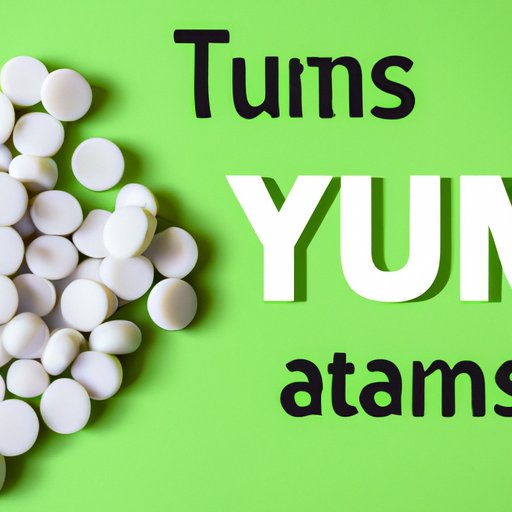
Introduction
If you’re suffering from heartburn or indigestion, you may have reached for TUMS as a quick relief option. However, you may be wondering how many TUMS can you take in a day to get safe and effective relief without any unwanted side effects. In this article, we’ll explore the dos and don’ts of TUMS, the safe and effective use of TUMS, the risks of a TUMS overdose, how to determine an appropriate TUMS dosage, and when it’s appropriate to seek medical attention for heartburn.
The Dos and Don’ts of TUMS: How Many is Too Many?
TUMS are a type of antacid that are commonly used for the relief of heartburn and indigestion. These chewable tablets contain calcium carbonate, which acts as a neutralizer for the acid in your stomach. The recommended dosage for TUMS is usually 2-4 tablets per dose, but this can vary depending on the individual and the severity of their symptoms.
It’s important to follow the recommended dosage guidelines because taking too many TUMS can result in negative side effects. If you take too much calcium carbonate, your body may have trouble absorbing other important nutrients. You may also experience constipation, stomach cramps, and even kidney stones if you’re not careful.
Finding Relief: The Safe and Effective Use of TUMS
If you’re experiencing heartburn or indigestion, it’s important to take TUMS with food and water. This can help the tablets dissolve quickly and get to work faster in your stomach. It’s also a good idea to avoid lying down immediately after taking TUMS, as this can slow down the absorption process.
The amount of time it takes for TUMS to work can vary depending on the individual and the severity of their symptoms. In general, TUMS should start providing relief within minutes of taking them. However, if you find that your symptoms persist or come back frequently, it’s best to speak with your healthcare provider to explore other treatment options.
TUMS Overdose: What You Need to Know
If you take too many TUMS, you may experience symptoms of an overdose. These can include nausea, vomiting, loss of appetite, constipation, confusion, and even kidney problems. If you experience any of these symptoms, it’s important to seek medical attention immediately.
When seeking medical attention for a TUMS overdose, it’s important to bring the container of TUMS with you so that the healthcare provider can determine how much you’ve taken. You may also undergo blood and urine tests to determine if there are any issues with your kidney function.
Managing Heartburn: A Guide to Proper TUMS Dosage
Determining the appropriate TUMS dosage for individuals can vary depending on several factors, including weight, age, and medical history. If you’re pregnant or nursing, it’s especially important to speak with your healthcare provider before starting any new medication, including TUMS.
In general, it’s a good idea to start with the lowest recommended dose of TUMS and gradually increase as needed. It’s also important to monitor any changes in your symptoms and adjust your dosage accordingly. If you find that you’re taking TUMS frequently and consistently, it may be a sign that your heartburn or indigestion requires more aggressive treatment.
TUMS: The Good, the Bad, and the Limit
TUMS can be a great option for people suffering from occasional heartburn or indigestion, but they should be used in moderation. Frequent and consistent use of TUMS can have negative side effects, including weakened bones, chronic kidney disease, and even kidney failure.
If you find that you’re relying on TUMS frequently to alleviate symptoms, it’s important to speak with your healthcare provider to explore other treatment options, such as lifestyle changes or more aggressive medications.
When to Say When: Understanding TUMS Dosage and Usage
It’s important to remember that TUMS are a temporary solution to heartburn and indigestion symptoms. If you find that you’re consistently taking TUMS or that your symptoms are becoming more severe, it’s important to speak with your healthcare provider to explore other treatment options.
In general, it’s appropriate to seek medical attention for heartburn if you experience symptoms for more than two days a week, if your symptoms don’t improve with medication or lifestyle changes, or if you’re experiencing other symptoms such as difficulty swallowing or vomiting blood.
Final Thoughts and Conclusion
TUMS can be a great option for quick relief of heartburn and indigestion symptoms, but it’s important to use them safely and effectively. Following recommended dosages, taking TUMS with food and water, and monitoring any negative side effects can help ensure that you’re getting effective relief without unwanted complications.
Remember, if you’re experiencing frequent or severe symptoms, it’s important to speak with your healthcare provider to explore other treatment options and rule out any underlying health issues that may be contributing to your heartburn or indigestion.




